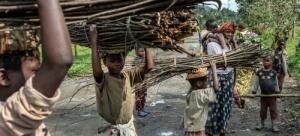Finance & Economics
One in every 10 children works - instead of going to school

Children carry bundles of sticks along the road in North Kivu province in the Democratic Republic of the Congo.
- Read more
- 131 reads
Government of Nepal and the World Bank Sign $120 Million Concessional Loan Financing Agreement and $19.7 Million Grant Agreement to Strengthen Nepal’s School Sector
The Government of Nepal and the World Bank on 31 May signed a financing agreement for $120 million concessional loan from the International Development Association and a grant agreement for $19.7 million from the Global Partnership for Education for the School Sector Transformation Program (SSTP) Operation, which support the implementation of the government’s flagship School Education Sector Plan.
- Read more
- 146 reads
GCC Economic Growth Expected to Slow to 2.5% in 2023
The economies of the Gulf Cooperation Council (GCC) are projected to grow at a slower pace in 2023 compared to the previous year, in the face of lower oil and gas earnings and a global economic slowdown, according to the new World Bank Gulf Economic Update (GEU). The GCC is expected to grow by 2.5% in 2023 and 3.2% in 2024. This compares to the region’s remarkable GDP growth of 7.3% in 2022, which was fueled by a strong increase in oil production for most of that year.
- Read more
- 157 reads
Lebanon: Normalization of Crisis is No Road to Stabilization
Behind a façade of normalization of crisis conditions, the Lebanese economy remains in precipitous decline, markedly distant from a stabilization path, let alone a recovery path, according to the latest World Bank Lebanon Economic Monitor released today. The systemic failure of Lebanon’s banking system and the collapse of the currency have induced a pervasive dollarized cash economy estimated at almost half of GDP in 2022.
- Read more
- 145 reads
TSRI and World Bank Partner to Strengthen Innovation in Thailand
The Thailand Science, Research and Innovation (TSRI) agency and the World Bank have partnered to strengthen national innovation policies and drive productivity growth in Thailand. Accordingly, the two sides will conduct a Policy Effectiveness Review (PER) of Thailand’s innovation policies to assess the quality of policy implementation in science, technology, and innovation of the private sector. The PER will include building a profile of Thailand's science, technology, and innovation policy instruments in evaluating the alignment of current policies with the country's needs in these areas.
- Read more
- 163 reads
Brazil can be both richer and greener: World Bank Group outlines opportunities for climate action and growth
Brazil is in a strong position to give its people a better life while also successfully confronting the threat of climate change, a new World Bank Group report released said, on May 4.
- Read more
- 148 reads
The World Bank to help Bulgaria benefit from its geothermal resources
The World Bank will provide analytical and advisory support to the Bulgarian Ministry of Energy to make the most of the country’s geothermal natural assets. An agreement for the provision of Reimbursable Advisory Services for Geothermal Energy for Energy Security in Bulgaria was signed by Lasse Melgaard, World Bank Resident Representative for Bulgaria, Czechia, and Slovakia and Rosen Hristov, Minister of Energy of the Republic of Bulgaria, on May 4.
- Read more
- 137 reads
The Silent, Deep Human Capital Crisis Facing Pakistan: The Country Needs to Substantially Increase its Investments in Human Development
The World Bank’s report, Pakistan Human Capital Review (HCR), Building Capabilities Throughout Life, underlines the need for Pakistan to significantly increase investments in human capital to address the severe gaps it faces in education and health outcomes particularly.
- Read more
- 162 reads
The Palestinian Economy Remains Vulnerable Amid Socio-Political Instability
According to a new World Bank report, Palestinian economic growth is expected to soften in 2023. While the economy had continued to rebound at a rate of 4% in 2022, this was driven by the ongoing recovery of private consumption as COVID-19 mobility restrictions eased. However, increased tensions in the Palestinian territories and the spillovers from the Russian invasion of Ukraine continue to pose significant downside risks.
- Read more
- 155 reads
Countries That Bolster and Protect Their Human Capital Will Better Withstand Future Economic Shocks
Countries that protect their population’s education, health, knowledge, and skills – that is, their human capital - now and during future shocks will emerge with lower levels of negative economic impact than those that do not, according to a new World Bank report released, on May 1st.
- Read more
- 150 reads
Human Rights
Ringing FOWPAL’s Peace Bell for the World:Nobel Peace Prize Laureates’ Visions and Actions

Protecting the World’s Cultural Diversity for a Sustainable Future

The Peace Bell Resonates at the 27th Eurasian Economic Summit

Declaration of World Day of the Power of Hope Endorsed by People in 158 Nations

Puppet Show I International Friendship Day 2020

